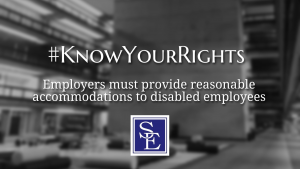Most people are aware that the state and federal law can provide legal protection against sexual harassment and other discriminatory conduct to employees in the workplace. No job-related action, from recruitment and interviewing to compensation or discharge can be intentionally influenced or biased by an employee’s protected class, such as sex, gender, race, disability and others protected classes. But what if the individual is discriminated or harassed outside the employment? Will the law provide any protection to an individual who is subjected to sexual harassment or other forms of discrimination in places outside the employment, such as government building, campaign organizations or within a police department? The Appellate Division has issued a decision providing further guidance in situations in which a person is subjected to non-employment related discrimination in a case entitled Holmes v. Jersey City Police Department.
 The case involves a transgender man, who was arrested for shoplifting and brought to the Jersey City Police Department for processing. The individual, Mr. Holmes, presented his valid driver’s license indicating his gender as male at the time of the arrest. After fingerprinting revealed Holmes’ former name and gender, the officers used offensive and demeaning language to verbally harass Mr. Holmes for the duration of his time at the police station. The officers also moved Mr. Holmes from a male holding cell to a female holding cell despite Mr. Holmes’ identification as male.
The case involves a transgender man, who was arrested for shoplifting and brought to the Jersey City Police Department for processing. The individual, Mr. Holmes, presented his valid driver’s license indicating his gender as male at the time of the arrest. After fingerprinting revealed Holmes’ former name and gender, the officers used offensive and demeaning language to verbally harass Mr. Holmes for the duration of his time at the police station. The officers also moved Mr. Holmes from a male holding cell to a female holding cell despite Mr. Holmes’ identification as male.
The New Jersey Law Against Discrimination prohibits gender-based discrimination and sexual harassment in a place of public accommodation. A place of public accommodation is any place that is open to the public, including schools, businesses, restaurants, government buildings and healthcare facilities. Public place accommodation violations include the use of offensive language, the display of demeaning images such as pornography or inappropriate drawings, as well as unwanted touching and other forms of physical harassment. This harassment can be unlawful regardless of whether it’s performed by an employee of the public place or another patron. Places of public accommodation have legal obligations to ensure that they have policies and procedures in place to prevent and stops the harassment once it knows about it or should have known about it, and it may not retaliate against the individual who was harassed or complained about harassment.
Holmes filed a lawsuit against the Jersey City Police Department claiming violations of the LBGT discrimination resulting from the officers’ harassing treatment of Holmes during his arrest. After the trial court first granted Jersey City Police Department summary judgment, the Appellate Division reversed and remanded the matter for trial. In so doing, the Appellate Division found that a reasonable transgender person who was under arrest, and therefore at a significant power disadvantage, could consider the environment created by the officers’ behavior toward Holmes to be threatening and hostile. This can be the case even though the harassment was limited to one occurrence – so long as a jury could consider the harassment severe or pervasive to a reasonable person in the same protected class.
At trial, the jury found Holmes’ claims of harassment credible and determined that because a police station is a place of public accommodation, the Jersey City Police Department violated his rights under the New Jersey Law Against Discrimination. Although no monetary damages were awarded, the Court awarded equitable relief requiring the Jersey City Police Department to provide sensitivity training to its employees annually, specifically in regard to their interactions with transgender individuals. After this reversal of the summary judgment decision, the Jersey City Police Department instituted new policies and procedures to govern officers’ interactions with transgender individuals. The Court also awarded Holmes attorneys’ fees and costs.
The Jersey City Police Department appealed the Court’s order granting equitable relief as well as the award of attorneys’ fees and costs. On the question of equitable relief, the Appellate Division reversed and remanded to the trial level yet again. The Court found that the New Jersey Law Against Discrimination offers a full range of remedies to protected individuals harmed by discrimination and harassment, especially when those remedies can serve to further the public interest of eradicating such unlawful behavior, whether in employment or at places of public accommodation. Damages available under the state discrimination law are not limited to monetary awards.
On the issue of attorneys’ fees and costs, the Jersey City Police Department argued that Holmes was not really a “prevailing party” entitled to such fee shifting under the law. The Court disagreed, finding that Holmes did indeed prevail. Even without an award of compensatory or punitive damages, Holmes’ litigation against the Jersey City Police Department was the direct cause of its decision to implement new procedures for its interactions with transgender arrestees. Because Holmes’ claim against the Jersey City Police Department affected a modification to the Jersey City Police Department’s policies that directly benefited Holmes, and the jury found in his favor under the LAD, he was successful and, therefore, a prevailing party entitled to attorneys’ fees and costs.
Although the Appellate Division remanded on the issue of the equitable relief, Holmes prevailed and laid a path for all transgender individuals in New Jersey to be granted necessary protections in their interactions with law enforcement and as it relates to public places of accommodation. With the help of this decision, New Jersey continues to be in forefront of states who provide legal protections to persons who are victims of discrimination.
 New Jersey Employment Lawyers Blog
New Jersey Employment Lawyers Blog

